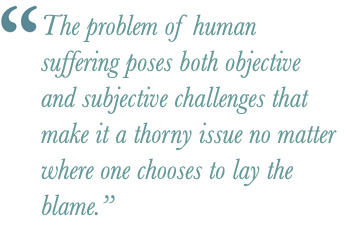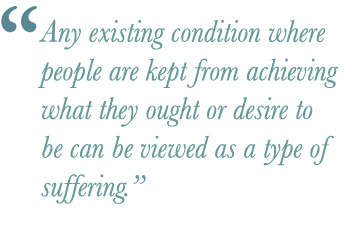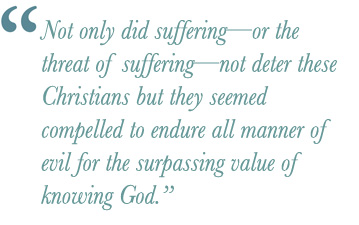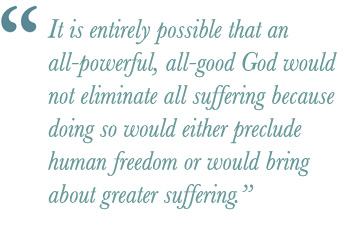The mere existence of suffering, pain, and evil in the world is, without question, problematic to the Christian worldview. How could one not react with shock and disbelief at the horrors unleashed at Auschwitz, Dachau, and other concentration camps under Hitler’s Third Reich? Who could possibly be oblivious to the mass killings in Cambodia, Bangladesh, Rwanda, Bosnia, Darfur, Iraq, and elsewhere? Our moral sensitivities will not let us forget these and many other atrocities that have been perpetrated across the globe and throughout the ages. Why are such afflictions seemingly unavoidable? Where is God when such horrors emerge?
This problem is made all the more difficult because of the emotions that accompany suffering. The loss of a loved one causes intense psychological pain that often overwhelms us. The underlying heartache may cause us to abandon reason and commonly leads to bitterness and despair. Thus, human suffering is both an objective and subjective challenge, a complex and contentious issue no matter where one chooses to lay the blame.
Why do people sometimes suffer and die in agonizing or seemingly pointless ways? When confronted with the question of why an all-powerful God would allow such evil and suffering to exist, many Christians have no answer. However, the fact that a Christian does not have a ready answer to the problem is not itself evidence against the existence of God. After all, even if there are good reasons for God to allow suffering, why should we think that a theist would be the first to know?[1]
A skeptic who claims that suffering nullifies belief in God, nevertheless, must press the argument further. Indeed, he or she must demonstrate that the mere existence of evil in the world makes belief in God irrational or unreasonable. However, to do this, the skeptic must show that it is impossible or, at the very least, unlikely that God has sufficient reasons for permitting evil.[2]
The present paper will be confined to two topics: (1) human suffering—specifically the type that is caused by moral evil, and (2) possible reasons why human suffering might exist in a world where an all-good, all-powerful God (i.e., the God of Christian theism) exists. The topics of natural evil[3] and animal suffering will not be considered in the current essay.
Definition of Terms
Physical Pain is an unpleasant and often extreme sensory experience that is sometimes associated with actual or potential tissue damage. While it is usually undesirable, sometimes pain acts for human benefit. For example, reflexive pain is on display when we involuntarily jerk our hands away from a fire before suffering serious injury. Indeed, pain often alerts us to the fact that there is something wrong with our body, thus prompting us to seek immediate relief or medical attention. In other cases, pain may be recognized and welcomed as something we need or want. Without this type of pain, we would not know, for example, that we have a sprained ankle or suffer from acute appendicitis. Therefore, not all pain and, hence, not all suffering is unneeded, unwanted, or unwarranted.
Suffering. For this paper, suffering will be defined as psychological pain, which may (or may not) be brought about by physical pain. That is, physical and psychological pain may be experienced differently. The author will draw a distinction between the pain experienced by animals and the suffering experienced by humans. While both humans and animals experience pain, the extent of “psychological reactions” to pain by animals is unknown. In other words, whether pain in non-human animals leads to states like introspection, self-reflection, depression, mental anxiety, or despair is undetermined. While animal pain is undoubtedly an important consideration for all who respect and seek to protect the animal kingdom, such pain may not lead to the same kind of suffering that we see in humans and, therefore, will be considered separately in a future essay.
According to philosopher Eleanore Stump, suffering in humans refers to any existing condition that keeps them from achieving what they ought or desire to be.[4] Chronic medical conditions, long-term physical and mental abuse, and the “pain” of losing a loved one are examples of the type of pain that may lead to human suffering. However, not all suffering violates a person’s will or desires. There are many who voluntarily suffer to achieve a desired end. For example, athletes and women who bear children may gladly accept pain and suffering as an essential part of what they willingly desire to be (i.e., an exemplary athlete or mother).[5]
Moral evil. For this paper, moral evil consists of those free actions that are contrary to God’s nature, will, or both.[6] Moral evil is a product of free human activity that may be perpetrated against others (e.g., armed robbery, torture, murder) or is self-directed (e.g., drug addiction). Moral evil can be distinguished from natural evil (see footnote 3).
Theodicy. For this paper, a theodicy represents any attempt to show that there are morally sufficient reasons for God to allow evil and suffering in the actual world. The current paper is not a theodicy and will not attempt to explain why God allows suffering and evil in the present world. The current author will not presume to know God’s reasons for allowing evil. Indeed, it may be beyond the capacity of finite humans to fully understand the intentions of an infinite God apart from explicit revelation.
Christian theistic defense. In the current essay, a theistic defense represents possible explanations for why an all-good, all-powerful God might allow evil, pain, and suffering in a putatively possible world. A putatively possible world is a world much like our own where the Christian God exists. It is a hypothetical world that is consistent with the Christian worldview and where one can propose possible reasons for the problems at hand, even though they might not be the actual reasons of God.
The current paper is a defense and will, therefore, offer reasons why evil and suffering might be allowed in a theistic world. By viewing the problem of suffering in this manner, the reader might see possible, though not necessarily actual, solutions for the problem of pain and suffering in the world. This allows the Christian theist to propose solutions without claiming to know the reasons of an infinite God. These modest solutions will be something for the reader to ponder and determine for herself whether they might be possible, plausible, or even probable.
Flourish. A human can be said to “flourish” if she experiences a close union of love with God and his creation. The Christian position is that all humans were created to reach personal fulfillment through a loving relationship with God and with other humans that will continue throughout eternity. Thus, flourishing is ultimately attained by the achievement of one’s desires insofar as they are aligned with the goal of unity with God. This paper will explore whether some kinds of pain and suffering may aid human flourishing in a putatively possible world.
The Argument Against God from Evil and Suffering

Many arguments are used to cast doubt on the existence of God. Typically, they appeal to the existence and prevalence of evil, suffering, and pain in the world. One argument goes like this:
- An omniscient, omnipotent, and perfectly good God exists.
- There is pain and suffering in the world.
- There is no morally sufficient reason for an omniscient, omnipotent, perfectly good God to allow pain and suffering in the world.
- Therefore, an omniscient, omnipotent, perfectly good God does not exist.
My defense of theism will stipulate that premises 1 and 2 are true. The defense will also concede that there seems to be an incompatibility between the simultaneous existence of an omniscient, omnipotent, perfectly good God and suffering in the world. Therefore, the defense will focus on premise 3 and consider whether there might be morally sufficient reasons for allowing suffering to exist. If it can be shown that premise 3 is false or unlikely, then the seeming incompatibility between premises 1 and 2 dissolves, and the argument from suffering loses its strength.
Suffering and Human Flourishing
According to Thomas Aquinas, “The ultimate good for any human person is union with God” [i.e., flourishing].[7] If this claim is true, two questions follow:[8]
- Does some suffering contribute to human flourishing (i.e., closeness to God)?
- Does some suffering help us achieve our greatest desires?
In response to question 1, suppose that suffering positively addresses the flourishing of humans by helping them achieve what they ought to be. In this important sense, suffering may be seen as God’s “medicine” for achieving one’s ultimate purpose.[9] It is possible that suffering may remove or balance the obstacles (e.g., pride, self-centeredness, anger, greed, and others) that prevent humans from coming into a closer relationship of love with God. If unity with God is the greatest possible good for humans, then flourishing may be compatible with suffering. Indeed, some suffering might be essential to flourishing.
The lives of many Christians of the first and second centuries bear witness to the strength of their belief in God and their willingness to suffer. Their relationship with God was more valuable than even their own lives. Pliny the Younger, writing to the emperor Trajan (c. A.D. 112), said that he attempted to make professed Christians curse the name of Christ. But he admitted that “those who are really Christians cannot be induced to [curse Christ’s name].[10] Even under the threat of imprisonment and torture, these early Christians would often choose God over the threats of their accusers. Such was their relationship with God that they could not be forced to deny their faith, even under extreme forms of moral evil. Not only did the threat of pain and suffering not deter these Christians, but, like the Apostle Paul, they seemed compelled to suffer afflictions for the surpassing value of knowing Christ (Phil. 3:7, 8; 2 Cor. 11:23–27).
Even non-believers in God may benefit through suffering. After noting the documented studies that have shown that people can and do benefit from the consequences of trauma and adversity, Stump suggests that God is present to everyone in times of suffering:
No sufferer is isolated from the love of omnipresent God; and to the extent to which the sufferer is open to it, the presence of God to that sufferer comes with shared attention and closeness, for the consolation of the sufferer.[11]
Thus, it is possible that suffering serves as a tool to help some humans flourish.[12]
However, what about the kinds of suffering that are so severe that they destroy one’s sense of responsibility for moral action and full mental functionality? For example, suppose one is subjected to prolonged torture such that she suffers irreversible physical and/or mental damage. Is it possible that this type of severe suffering might prevent a belief in God? What if the flourishing of humans is not limited to the present world but is eternal in scope? Stump believes that any response to the problem of suffering must necessarily include a mention of the afterlife: “The notion of an afterlife is central to any attempt at theodicy (or defense) that is to have a hope of being successful”[13].
It is a mistake to think that permanent physical and/or psychological suffering prevents one from flourishing. Otherwise, only those deemed “healthy” in body and mind would be able to flourish. God may allow humans to experience severe and perhaps irreversible physical and/or psychological suffering in this life if it provides them the opportunity to flourish in the afterlife.[14]
In response to question 2, Stump doubts that human desires are necessarily in sync with all that they ought to be. Says Stump: “Sometimes humans can set their hearts on things that aren’t necessary for their flourishing.”[15] Though suffering has been shown to lead to spiritual regeneration, growth, and, hence, a closer relationship with God, there is no guarantee that any individual will see suffering as a means to achieving her own desires. Thus, a loving and wise God would know what things people need to best establish their relationship with him. While the things that people desire can lead to unity with God, many desires—including those that are self-centered or uninformed—may not always lead to flourishing.
Suffering and an Omnipotent God
Some will say, there can be no morally sufficient reason for an omnipotent God to allow suffering in the world when he could easily prevent all evil. But do they really mean to suggest that an omnipotent God can do anything whatsoever to prevent all evil and suffering? Theologian Thomas Oden defines omnipotence as “the perfect ability of God to do all things that are consistent with the divine character.”[16] Alvin Plantinga suggests that God must always act in line with his perfections. He states: “What the theist typically means when he says that God is omnipotent is not that there are no limits to God’s power, but at most that there are no nonlogical limits to what He can do.”[17] Because God is perfect, he never acts in ways contradictory to his perfections. He will never bring about a square circle, a married bachelor, or a false truth.
The Free Will Defense
Given God’s perfect nature, it may be impossible to abolish all moral suffering without eliminating human free will. As Plantinga notes: “To create creatures capable of moral good, therefore, [God] must create creatures capable of moral evil, and He can’t give these creatures the freedom to perform evil and simultaneously prevent them from doing so.”[18]
Plantinga suggests a possible guiding principle: “A world containing creatures who are significantly free (and freely perform more good than evil actions) is more valuable, all else being equal than a world containing no free creatures at all.”[19] In other words, perhaps God allows humans the freedom to choose between good and evil acts because he considers it more valuable to have creatures who can freely choose rather than not have such free creatures. If it is true that God places more value on free creatures, then perhaps one morally sufficient reason for allowing suffering is to preserve free will.[20]
Suppose that one person wanted to kill another by using a gun. Should an all-powerful God respond by turning the bullets into bubbles? Or, if someone picked up a rock to throw at a window, should God turn the rock into a marshmallow? Such solutions would eliminate human free will and, instead, God’s will would usurp human action in the same way a driver controls a car. God would have to perform miracles at every turn. He would have to regularly break the laws of nature to intercede in such a manner.
A Loving Purpose for Some Suffering
Critics point to evil in the world and ask, How can God be wholly good? Eleonore Stump provides a helpful thought experiment that reveals a possible motive for allowing some evils.[21] Stump tells the story of an alien being named “Max.” He is an intelligent being who believes that nothing exists outside of the massive building in which he lives (i.e., the universe). Max knows very little of Earth, but in his world, no one ever gets seriously sick or dies. One day, Max sees a video that shows events happening inside a large city hospital on Earth where the Chief of Staff is a surgeon. Upon viewing this video, Max becomes indignant against the doctors, but especially against the Chief of Staff, for allowing what Max thinks are moral atrocities. He observes doctors inflicting pain by lancing people, cutting people open with scalpels, and running needles and string through bare skin (i.e., general anesthesia, surgery, and suturing). Max interprets these acts as constituting moral injustices administered by the doctors under the supervision of the Chief of Staff. Therefore, Max holds the Chief of Staff responsible for committing and causing others to commit morally reprehensible acts.
As suggested by the thought experiment, a non-theist looks at biblical stories and life in general and may see only atrocities. Non-theists live in a world where there is no God, nor is there an afterlife. Like a non-theist, Max sees suffering and pain inflicted upon people, but he doesn’t realize that by permitting the implementation of these acts, the Chief of Staff may be facilitating better health and longer life for the patients in the hospital (i.e., a life of flourishing both now and in the afterlife).
Suffering and Human Culpability
Whether one is a believer in God or not, she will probably agree that all humans are capable of evil and can inflict severe suffering on others if they so choose. Thus, the responsibility for moral suffering may reside solely with human free agents acting of their own accord (Rom. 3:9–18). The human inclination to commit evil acts and inflict suffering (called “sin” in the Bible) results from people turning away from God and following their own desires (Rom. 1:28–32). Such a condition is not compatible with flourishing.
Christian doctrine proclaims that Christ—who is both God and man—became the perfect sacrifice (Heb. 9:14) to redeem human creatures whose natural inclinations drive them to commit moral evil. In their natural state, humans are both mortal and corruptible[22] and yet ultimately redeemable. The predisposition to sometimes commit moral evil represents the reason why all humans must be redeemed by God’s grace through faith in Christ (Eph. 2:8; Gal. 2:16). Redemption represents the solution for sin and a lack of flourishing (Rom. 3:23, 24). Moreover, the redemption offered by God allows humans to flourish both now and in the afterlife. Indeed, without redemption, humans will not share in the afterlife (Jn. 3:36). According to Aquinas, the worst possible condition for humans is that they would never achieve, or even desire to achieve, a real closeness of love with God and that that condition might last eternally.[23]
Conclusion
The atheistic argument from suffering claims that suffering exists, and an all-powerful, all-good God does not have morally sufficient reasons for allowing suffering. Therefore, God cannot exist. However, a theistic defense casts this argument in a different light by asking a person to consider a possible world in which God and moral suffering both exist.
First, it may be that flourishing represents the greatest good for humans. If so, whatever brings one closer to God represents an aid to flourishing. If it is possible that suffering aids flourishing by removing obstacles that prevent humans from establishing a closer relationship with God, then some suffering may be compatible with flourishing.
Second, perhaps the reason for not removing all suffering is that such a process would preclude human freedom. Giving people free will and then rescinding it every time it is abused would leave humans bereft of true freedom. God may allow humans to freely choose between good and evil acts because he considers it more valuable than not to have truly free creatures.
Third, eliminating some suffering may bring about greater suffering. Physicians who conduct surgical procedures or prescribe cancer treatments may bring about pain and suffering in the short term. However, their long-term goal is to prevent greater suffering in the future and promote the overall health and well-being of their patients.
Fourth, it is possible that an all-good, all-powerful God would not eliminate all suffering because doing so may prevent human flourishing both now and in the afterlife. There may be spiritual benefits to suffering in the present as well as in the future. Indeed, some suffering may lead to ultimate flourishing in the presence of God for eternity.
Fifth, the responsibility for moral evil and suffering lie predominantly with free human agents acting of their own volition. The human propensity for evil may result from turning one’s back on God’s commands and pursuing one’s own desires. This may be why all humans need redemption. The greatest possible good—a close unity of love with God—may be achieved by accepting God’s grace through faith in Christ (Eph. 2:8; Gal. 2:16) and living a life in accordance with God’s will.
About the Author
David P. Diaz is an author and retired college professor. His writings have spanned the gamut from peer-reviewed technical articles to his memoir, which won the 2006 American Book Award. Dr. Diaz holds a Bachelor’s and Master of Science degrees from California Polytechnic State University, a Master of Arts in Philosophical Apologetics from Houston Christian University, and a Doctor of Education specializing in Computing and Information Technology from Nova Southeastern University. [back to top]
Bibliography
Athanasius. On the Incarnation. Translated by John Behr. Yonkers, NY: St Vladimir’s Seminary Press, 2011.
Bergmann, Michael, Michael J. Murray, and Michael C. Rea, eds. Divine Evil?: The Moral Character of the God of Abraham. Oxford: Oxford University Press, 2013.
Copan, Paul. Is God a Moral Monster?: Making Sense of the Old Testament God. Grand Rapids, MI: Baker Books, 2011.
Diaz, David P. “Socratic Dialogue: Does Man Have Free Will?” No pages. Cited 7 October 2021. Online: http://thingsibelieveproject.net/socratic-dialogue-does-man-have-free-will/.
Oden, Thomas C. Classic Christianity: A Systematic Theology. New York, NY: Harpercollins Publishers Inc, 2009.
Plantinga, Alvin. God, Freedom and Evil. Grand Rapids, MI: William B. Eerdmans, 2008.
Stump, Eleonore. Wandering in Darkness: Narrative and the Problem of Suffering. Oxford: Clarendon Press, 2013.
Stump, Eleonore. “Suffering, Evil, and the Desires of the Heart.” The Table, Biola CCT. February 9, 2018. Educational video, 1:12:06. https://youtu.be/VOOhQyiMtEU.
Trakakis, N. N., ed. The Problem of Evil: Eight Views in Dialogue. Oxford, UK: Oxford University Press, 2018.
Footnotes
[1] Alvin Plantinga, God, Freedom and Evil, Kindle ed., (Grand Rapids, MI: William B. Eerdmans, 2008), Kindle location 97.
[2] Ibid., Kindle location 112–13.
[3] Natural evil refers to the pain and suffering caused by natural causes, such as earthquakes, tsunamis, hurricanes, lightning strikes, pathogenic viruses, and many others.
[4] Eleonore Stump, Wandering in Darkness: Narrative and the Problem of Suffering (Oxford: Clarendon Press, 2013), 90–107.
[5] Stump, Wandering, 5–6.
[6] Stump, Wandering, 11.
[7] As cited in Stump, Wandering, 93.
[8] Stump, Wandering, 455–465.
[9] Eleonore Stump, “The Problem of Suffering: a Thomistic Approach,” in N. N. Trakakis, ed., The Problem of Evil: Eight Views in Dialogue (Oxford, UK: Oxford University Press, 2018), 17.
[10] Pliny the Younger, Epistulae X, 96.
[11] Stump, Wandering, 411.
[12] Though, according to Christian doctrine, there will be no more suffering in the afterlife (Rev. 21:4), some suffering in this life may be instrumental in bringing one to salvation or into a closer relationship with God. Thus, entrance into the afterlife may be attributed, at least in part, to suffering.
[13] Stump, Wandering, 419.
[14] Eleonore Stump, “The Problem of Evil and the History of the Peoples: Think Amalek,” in Michael Bergmann, Michael J. Murray, and Michael C. Rea, eds., Divine Evil?: The Moral Character of the God of Abraham (Oxford: Oxford University Press, 2013), 37–39.
[15] Eleonore Stump, “Suffering, Evil, and the Desires of the Heart,” The Table, Biola CCT. February 9, 2018. Educational video, 1:12:06. https://youtu.be/VOOhQyiMtEU.
[16] Thomas C. Oden, Classic Christianity: A Systematic Theology. (New York, NY: HarperOne, 2009), 51.
[17] Plantinga, God, Freedom, and Evil, Kindle locations 184–85 (italics added).
[18] Plantinga, God, Freedom, and Evil, Kindle Locations 342–343.
[19] Plantinga, God, Freedom, and Evil, Kindle Locations 340-341.
[20] Of course, all of this presupposes that humans possess libertarian free will. Though this topic is not addressed in this paper, the author has addressed it elsewhere: David P. Diaz, “Socratic Dialogue: Does Man Have Free Will?,” n.p. [cited 7 October 2021]. Online: http://thingsibelieveproject.net/socratic-dialogue-does-man-have-free-will/.
[21] Eleonore Stump, “Reply to Draper,” in Michel Bergmann, Michael J. Murray, and Michael C. Rea, eds., Divine Evil?: The Moral Character of the God of Abraham (New York, NY: Oxford, 2013), 204–208. https://doi.org/10.1093/acprof:oso/9780199576739.003.0020
[22] Athanasius, On the Incarnation, trans. John Behr (Yonkers, NY: St Vladimir’s Seminary Press, 2011), 54.
[23] As cited in Stump, Wandering, 387.





